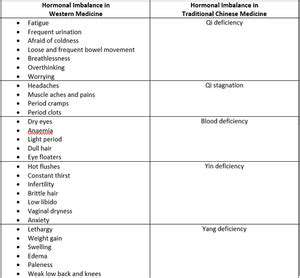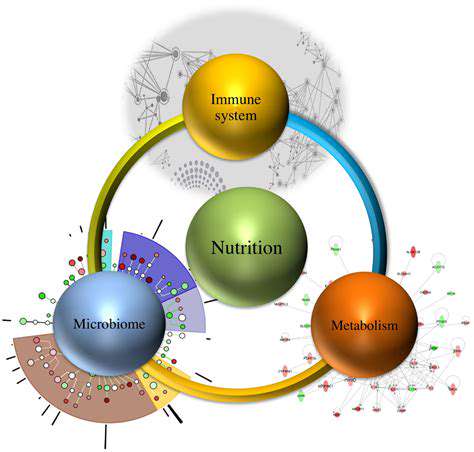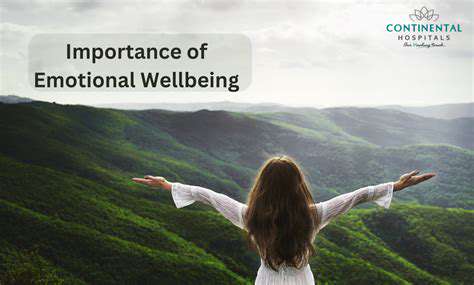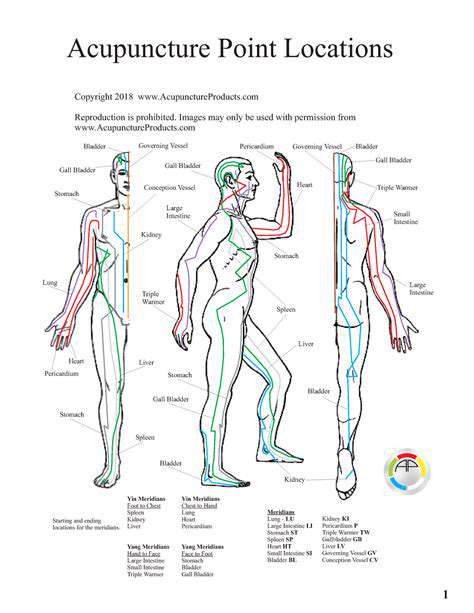TCM for Energy Boosting: Revitalize Your Qi
Understanding the Principles of Acupuncture
Acupuncture, a cornerstone of Traditional Chinese Medicine (TCM), is based on the concept of Qi (pronounced chee), the vital energy that flows through pathways called meridians throughout the body. Disruptions in the flow of Qi are believed to cause imbalances and pain. Acupuncture needles, strategically inserted into specific points along these meridians, stimulate the body's natural healing mechanisms, restoring the balance of Qi and promoting overall well-being. This ancient practice emphasizes the interconnectedness of mind, body, and spirit, recognizing that physical health is deeply intertwined with emotional and mental well-being.
Traditional Chinese Medicine (TCM) views the body as a complex system, where various organs and systems work in harmony. Imbalances in this system can manifest as physical discomfort, emotional distress, and even a lack of energy. Acupuncture aims to address these imbalances by restoring the flow of Qi, the life force, through the body, thereby promoting healing and overall vitality.
The Role of Qi in Energy Restoration
Qi, the life force, is a fundamental concept in Traditional Chinese Medicine. It is believed to be the vital energy that animates the body and sustains life. When Qi flows smoothly and harmoniously through the meridians, the body functions optimally. Conversely, blockages or imbalances in Qi can lead to a wide range of health issues, including fatigue, pain, and a diminished sense of well-being. Acupuncture aims to restore the balance of Qi, promoting a more natural and sustained energy level.
Targeted Points and Meridian Systems
Acupuncture points are specific locations on the body where energy is concentrated. These points are strategically placed along meridians, pathways that connect various organs and systems. Identifying and stimulating these points through the insertion of thin needles is a crucial aspect of acupuncture treatment. The practitioner carefully selects points relevant to the patient's specific condition and concerns, considering the interplay of Qi flow throughout the body.
Different meridian systems are associated with various organs and functions in the body. The practitioner uses this knowledge to target specific points that correspond to areas of imbalance or discomfort. By stimulating these points, acupuncture aims to restore the flow of Qi, promoting the body's natural healing processes and improving energy levels.
Acupuncture and Energy Meridians
The concept of meridians, pathways that carry Qi throughout the body, is central to acupuncture. These unseen channels are believed to connect different organs and systems, regulating their function and influencing overall well-being. Stimulating specific points along these meridians is thought to influence the flow of Qi, restoring balance and improving energy levels. The practitioner's understanding of these pathways and their connection to specific organs is crucial for effective treatment.
Beyond Physical Benefits: Mental and Emotional Well-being
Acupuncture isn't just about physical ailments; it also addresses mental and emotional well-being. Stress, anxiety, and emotional imbalances can significantly impact energy levels and overall health. Acupuncture can help to restore emotional harmony, reduce stress, and improve mental clarity. By addressing the root causes of imbalance, acupuncture facilitates a more holistic approach to well-being, improving not only physical energy but also mental and emotional vitality.
Safety and Considerations for Treatment
Acupuncture is generally considered a safe and effective treatment when performed by a qualified and licensed practitioner. It's crucial to choose a practitioner with extensive training and experience in Traditional Chinese Medicine (TCM). Potential side effects are typically mild and temporary, such as slight soreness at the insertion points. It's important to communicate any underlying health conditions or concerns with the practitioner before undergoing acupuncture treatment. A thorough consultation helps tailor the treatment plan to individual needs and ensure optimal safety and efficacy.
The legal battleground is often characterized by entrenched positions and a focus on adversarial strategies. This approach, while sometimes necessary, frequently fails to address the underlying issues and needs of the parties involved. A more holistic approach is crucial for achieving a sustainable resolution, one that considers the long-term implications and fosters a sense of shared responsibility.
Herbal Remedies: Natural Energy Boosters
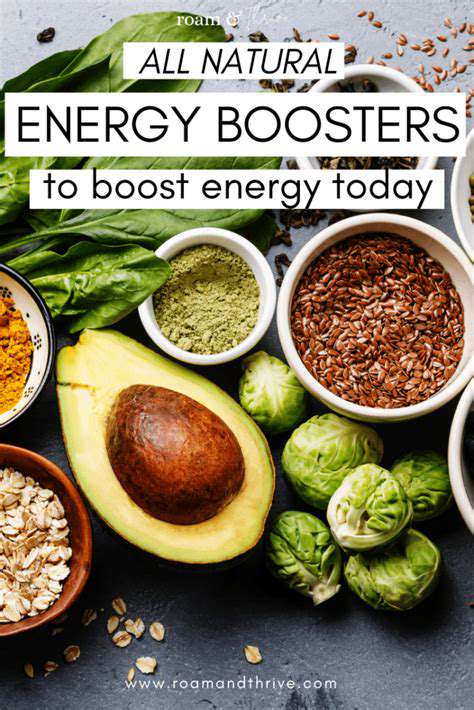
Harnessing the Power of Nature for Enhanced Vitality
Herbal remedies offer a wealth of natural options for boosting energy levels and promoting overall well-being. By tapping into the potent properties of various plants, individuals can experience a renewed sense of vitality without relying on potentially harmful synthetic stimulants. Exploring the diverse world of herbal remedies can lead to a more holistic approach to health, emphasizing the connection between nature and our bodies.
Many herbal remedies are known for their ability to support the body's natural energy production processes. This can manifest in increased stamina, improved focus, and a general sense of well-being. Understanding the specific mechanisms by which these remedies work can provide valuable insights into their effectiveness and potential benefits.
Understanding the Role of Adaptogens
Adaptogens are a category of herbs known for their ability to help the body cope with stress. These remarkable plants work by supporting the body's natural response to various stressors, whether physical, mental, or emotional. Adaptogens can help regulate hormone levels, reduce fatigue, and promote a sense of balance and equilibrium.
Common adaptogens include ginseng, ashwagandha, and rhodiola. These herbs have been used for centuries in traditional medicine systems, and modern research continues to explore their remarkable properties.
Exploring Energizing Herbs like Ginseng and Guarana
Ginseng, a well-known herbal remedy, is often associated with increased energy levels and improved focus. Its purported effects on mental clarity and physical stamina make it a popular choice for those seeking natural ways to enhance their performance. The stimulating properties of ginseng are often attributed to its adaptogenic qualities.
Guarana, another potent herbal remedy, also contributes to a feeling of increased energy. It contains caffeine, a natural stimulant that can provide a noticeable boost in alertness and focus. However, it's important to note that the caffeine content varies between different guarana products.
The Importance of Dietary Considerations
A balanced diet plays a crucial role in supporting energy levels, regardless of the use of herbal remedies. Consuming nutrient-rich foods, such as fruits, vegetables, and whole grains, provides the body with the essential vitamins, minerals, and antioxidants necessary for optimal function. Pairing herbal remedies with a healthy diet can significantly enhance their effectiveness and promote overall well-being.
Safety Precautions and Considerations
While herbal remedies are generally considered safe, it's crucial to consult with a healthcare professional before incorporating them into your routine, especially if you have underlying health conditions or are taking other medications. Certain herbs may interact with medications, and careful consideration of potential side effects is essential.
Always choose reputable sources for herbal products and ensure that the products meet quality standards. Reading product labels carefully and adhering to recommended dosages is critical for safe and effective use.
Conclusion: A Holistic Approach to Energy
Herbal remedies offer a natural and potentially beneficial approach to enhancing energy levels. However, it's vital to approach these remedies with caution and seek professional guidance when necessary. Integrating herbal remedies into a holistic lifestyle that includes a healthy diet, regular exercise, and stress management techniques can contribute to optimal energy levels and overall well-being.
Lifestyle Adjustments for Optimal Qi Flow

Prioritizing Sleep
Getting sufficient sleep is paramount for overall well-being and plays a crucial role in maintaining a healthy lifestyle. A consistent sleep schedule, even on weekends, helps regulate your body's natural sleep-wake cycle, improving sleep quality and duration. Establishing a relaxing bedtime routine, such as taking a warm bath or reading a book, can signal to your body that it's time to wind down and prepare for sleep.
Creating a sleep-conducive environment is also essential. This includes ensuring your bedroom is dark, quiet, and cool. Consider using blackout curtains, earplugs, or a white noise machine to block out disruptive elements. Investing in a comfortable mattress and pillows can significantly enhance your sleep experience.
Nourishing Your Body
Adopting a balanced and nutritious diet is fundamental to a healthy lifestyle. Focus on incorporating a variety of fruits, vegetables, lean proteins, and whole grains into your meals. These foods provide essential vitamins, minerals, and antioxidants that support various bodily functions.
Limiting processed foods, sugary drinks, and excessive saturated fats is crucial for maintaining optimal health. Prioritizing whole, unprocessed foods will not only nourish your body but also contribute to sustained energy levels and improved mental clarity.
Managing Stress Effectively
Stress is an inevitable part of modern life, but its impact on our well-being can be significant. Developing healthy coping mechanisms for stress is vital for maintaining a positive and balanced lifestyle. Regular exercise, meditation, or engaging in hobbies can help manage stress levels and promote a sense of calm.
Identifying and addressing the root causes of stress is also important. This might involve setting realistic goals, learning to say no to excessive commitments, or seeking support from friends, family, or a therapist. Understanding your stressors and developing strategies to mitigate them can significantly reduce their impact.
Engaging in Regular Physical Activity
Physical activity is crucial for maintaining physical and mental well-being. Incorporating regular exercise into your routine, even in small increments, can significantly improve cardiovascular health, strengthen muscles, and boost energy levels.
Finding activities you enjoy, such as dancing, swimming, or hiking, can make exercise more sustainable and enjoyable. Aim for at least 150 minutes of moderate-intensity or 75 minutes of vigorous-intensity aerobic activity per week, along with muscle-strengthening activities on two or more days a week.
Prioritizing Mental Well-being
Taking care of your mental health is just as important as taking care of your physical health. Practicing mindfulness, meditation, or journaling can help you stay grounded and manage stress. Mindfulness can improve your self-awareness and help you cope with difficult emotions.
Connecting with loved ones, pursuing hobbies, or engaging in activities that bring you joy are essential for maintaining a positive outlook. Seeking professional help, if needed, is also a valuable step in prioritizing your mental well-being.
Building Healthy Habits
Establishing healthy habits is a gradual process that requires consistency and self-awareness. Track your progress, celebrate milestones, and don't get discouraged by setbacks. Consistency is key to building lasting lifestyle adjustments.
Focusing on small, achievable goals can make the process less overwhelming. Start with one or two lifestyle changes and gradually incorporate others as you feel comfortable. Seeking support from friends, family, or support groups can provide encouragement and accountability.



